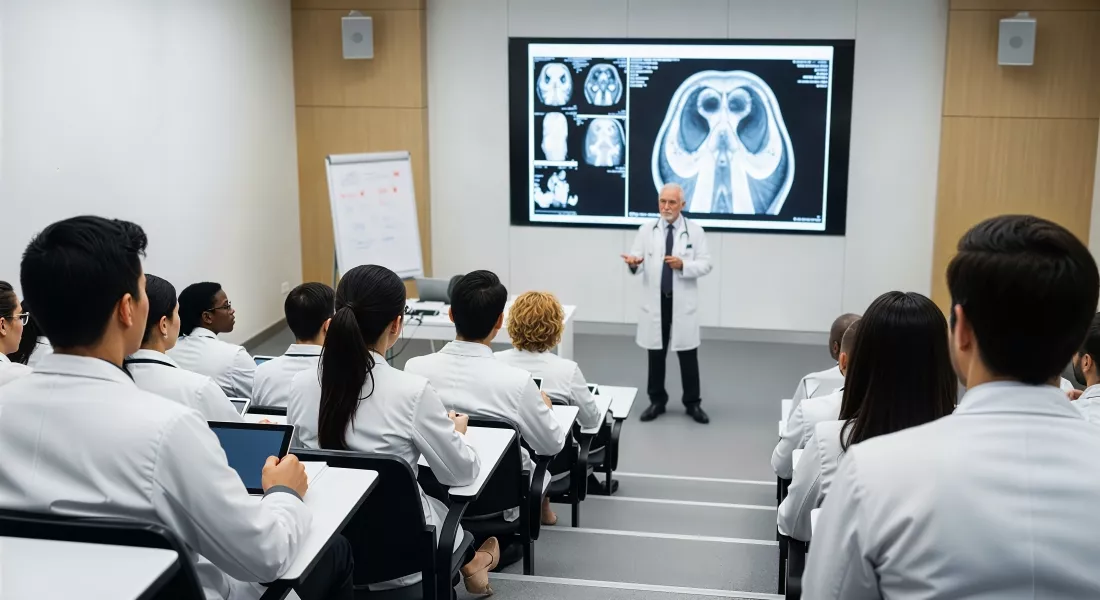
Educating future doctors involves more than just imparting knowledge of biology or chemistry; it is also about learning how to build relationships with patients. The Medical University of Warsaw's six-year program in English emphasizes combining a solid scientific foundation with social competencies. This approach prepares students for the challenges of modern medicine and the expectations of the job market, all while adhering to national and international standards.
The curriculum at the WUM Faculty of Medicine is designed to provide the highest level of education. The foundation is current medical knowledge based on scientific evidence, combined with the development of practical skills. Social competencies are considered equally important. Students learn how to establish connections with patients and collaborate with other members of the therapeutic team in an atmosphere of mutual respect and understanding. This comprehensive approach aims to prepare graduates for work in a diverse medical environment.
The university employs innovative didactic methods tailored to the needs of students and a dynamic environment. In addition to compulsory subjects, students have access to a wide range of elective courses. Modules in fundamental, pre-clinical, and clinical sciences allow for the development of individual interests and passions, fostering a deeper understanding of selected medical fields.
The study program is comprehensive and covers the broad spectrum of knowledge necessary to practice medicine. The education is divided into several key thematic blocks:
Morphology: Covering clinical anatomy and histology with embryology.
Scientific basis of medicine: Including biophysics, biochemistry, physiology, genetics, and research methodology.
Pre-clinical classes: Such as microbiology, immunology, pharmacology, toxicology, and pathomorphology.
Behavioral and social sciences: Medical psychology, medical communication, ethics, and the history of medicine.
Clinical subjects: Both surgical and non-surgical, allowing students to become familiar with various specializations, including pediatrics, internal diseases, surgery, gynecology, oncology, and radiology.
Legal and organizational aspects of medicine: Including hygiene and epidemiology, public health, and forensic medicine.
A key component of the education is the gradual transition from theoretical knowledge to practical application. Starting in their fourth year, students participate in practical clinical classes. This gives them the opportunity to apply their acquired knowledge in real hospital settings under the supervision of experienced specialists. This model allows for a smooth entry into the medical environment and better preparation for future professional work.
Mandatory summer clerkships, which take place after each academic year, are another crucial element of the program. In total, students complete 20 weeks of vocational training. These internships provide a chance to gain valuable experience in various medical facilities and learn the specifics of working in departments with different profiles. It is not just a curriculum requirement but, above all, an opportunity to develop practical skills.
Graduates of the medical program at the Medical University of Warsaw are well-prepared to pass the Polish Medical Licensing Examination (LEK). The high scores they achieve open doors to their desired specializations and postgraduate residencies. Graduating from WUM provides a solid foundation for further education in postgraduate or PhD studies, as well as for professional training.
A diploma from the Medical University of Warsaw is well-recognized in the job market. Graduates find employment in public and private healthcare facilities, hospitals, clinics, as well as at medical universities and research institutes. They can also build careers in advisory institutions that promote health education and in bodies dealing with case law and sanitary surveillance.
The six-year medical program in English at the Medical University of Warsaw offers comprehensive preparation for a career as a doctor. It combines a solid theoretical foundation with intensive practical training, placing a strong emphasis on developing communication and social skills. Thanks to modern teaching methods and a wide range of elective courses, students can pursue their passions and, upon graduation, successfully navigate the job market across various sectors of the healthcare industry.